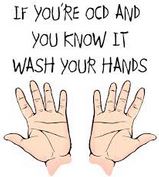
OCD is an anxiety disorder with symptoms of obsessions (intrusive and persisting upsetting thoughts, ideas, images or impulses) and compulsions (behaviours and rituals designed to undo the anxiety caused by the obsession). Sometimes the rituals are behaviours you can see (e.g. checking, ordering, washing, cleaning, counting, asking for reassurance) and sometimes they are mental rituals (like counting, repeating special words, numbers or phrases silently, praying).
At times the person with OCD will do these rituals on their own and try to hide them from you. At other times, they may try to involve your help (e.g. get you to do some checking too). The obsessions can be about anything and may include themes involving health, sexual behaviour and identity, safety, aggression and religion.
Common Examples
For example, someone may have the intrusive thought that they have germs on their hands, so they will feel compelled to wash their hands repetitively (sometimes a certain number of times, sometimes in a certain ritualised way). This may take up a considerable amount of time as they do not rely on their senses to decide when to stop or start washing. Instead, they rely on whether they “feel contaminated” or “feel better” rather than any visible signs of contamination. The washing ritual will reduce their anxiety in the short term, but keep the OCD going in the long term as it reinforces the belief that the way to undo the obsessions is to wash in this way.
Vicious cylces
Thus, people with OCD get caught in vicious cycles of trying to reduce their anxiety by giving into obsessions with behaviours that only end up keeping their anxiety and obsessions going. Usually they are aware that the obsessions and compulsions are irrational or excessive, but they have not learned other ways of dealing with these distressing obsessions. This is why it is very important to seek some professional help with this very challenging and upsetting disorder.
Getting Help
People with OCD often have a lot of shame about their condition and so hide much of what they are doing and thinking from others and are reluctant to seek help. There are very effective treatments for OCD, particularly Cognitive Behaviour Therapy (CBT), and it is unlikely to get better without some intervention. In fact, while some obsessions or compulsions may reduce, they are often replaced by different obsessions or compulsions.
Getting treatment early is important as the longer OCD runs the sufferer’ s life, the more restricted their life can become as the OCD infiltrate’s more areas of their life and leads to more avoidance of situations that are involved in the OCD system. Learning ways of gaining back control of your life so that the OCD does not control you is a big feature of therapy. For more information on treatment for OCD, see my article.
At times the person with OCD will do these rituals on their own and try to hide them from you. At other times, they may try to involve your help (e.g. get you to do some checking too). The obsessions can be about anything and may include themes involving health, sexual behaviour and identity, safety, aggression and religion.
Common Examples
For example, someone may have the intrusive thought that they have germs on their hands, so they will feel compelled to wash their hands repetitively (sometimes a certain number of times, sometimes in a certain ritualised way). This may take up a considerable amount of time as they do not rely on their senses to decide when to stop or start washing. Instead, they rely on whether they “feel contaminated” or “feel better” rather than any visible signs of contamination. The washing ritual will reduce their anxiety in the short term, but keep the OCD going in the long term as it reinforces the belief that the way to undo the obsessions is to wash in this way.
Vicious cylces
Thus, people with OCD get caught in vicious cycles of trying to reduce their anxiety by giving into obsessions with behaviours that only end up keeping their anxiety and obsessions going. Usually they are aware that the obsessions and compulsions are irrational or excessive, but they have not learned other ways of dealing with these distressing obsessions. This is why it is very important to seek some professional help with this very challenging and upsetting disorder.
Getting Help
People with OCD often have a lot of shame about their condition and so hide much of what they are doing and thinking from others and are reluctant to seek help. There are very effective treatments for OCD, particularly Cognitive Behaviour Therapy (CBT), and it is unlikely to get better without some intervention. In fact, while some obsessions or compulsions may reduce, they are often replaced by different obsessions or compulsions.
Getting treatment early is important as the longer OCD runs the sufferer’ s life, the more restricted their life can become as the OCD infiltrate’s more areas of their life and leads to more avoidance of situations that are involved in the OCD system. Learning ways of gaining back control of your life so that the OCD does not control you is a big feature of therapy. For more information on treatment for OCD, see my article.
 RSS Feed
RSS Feed